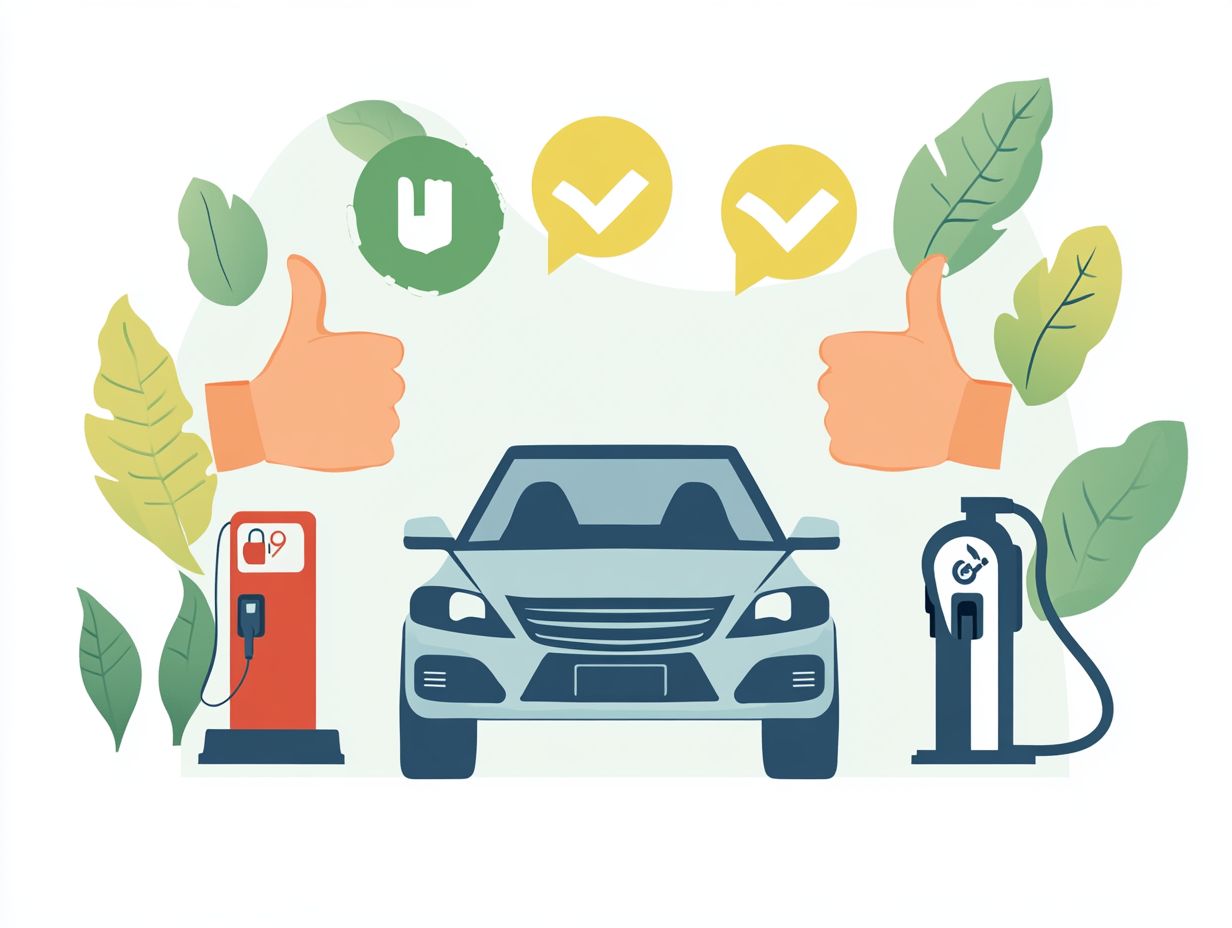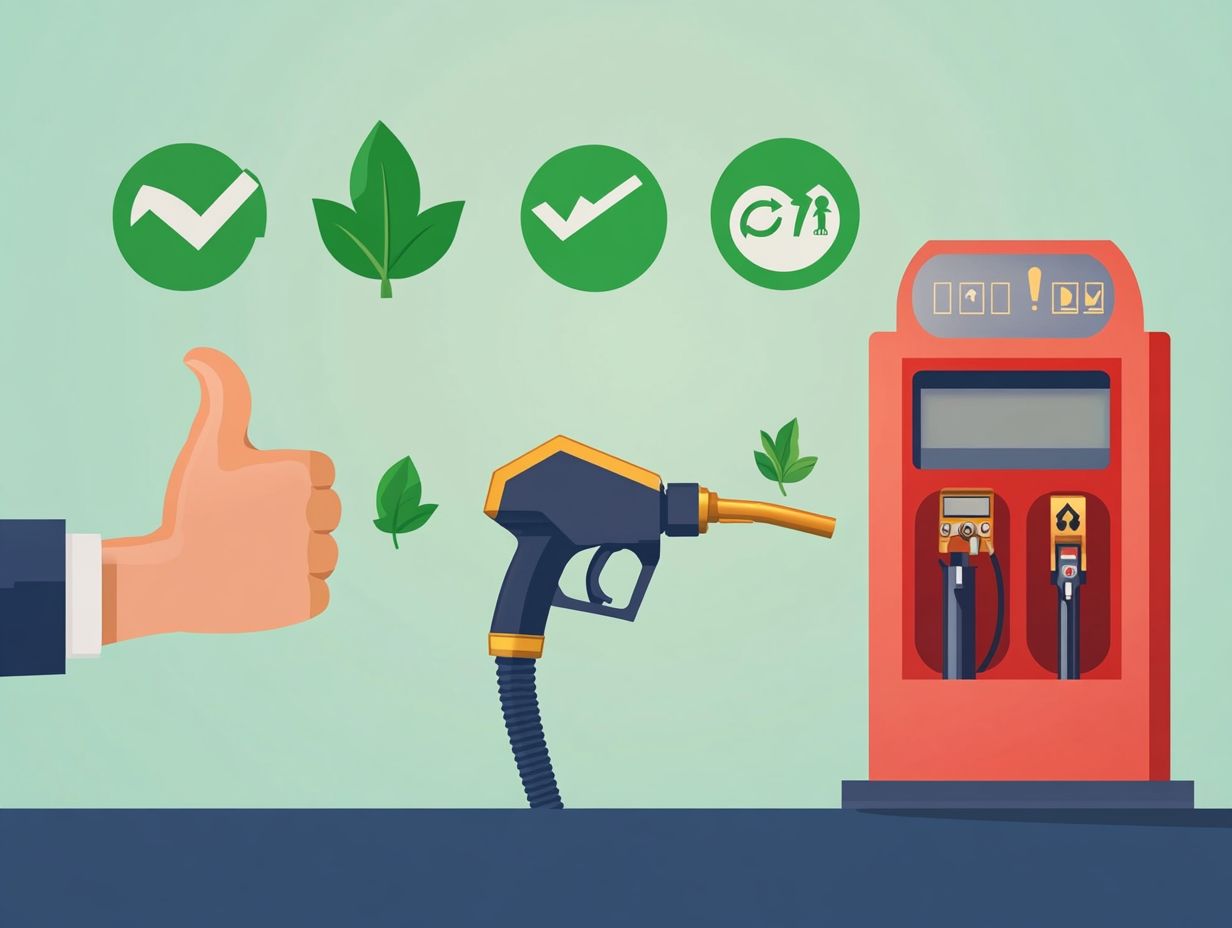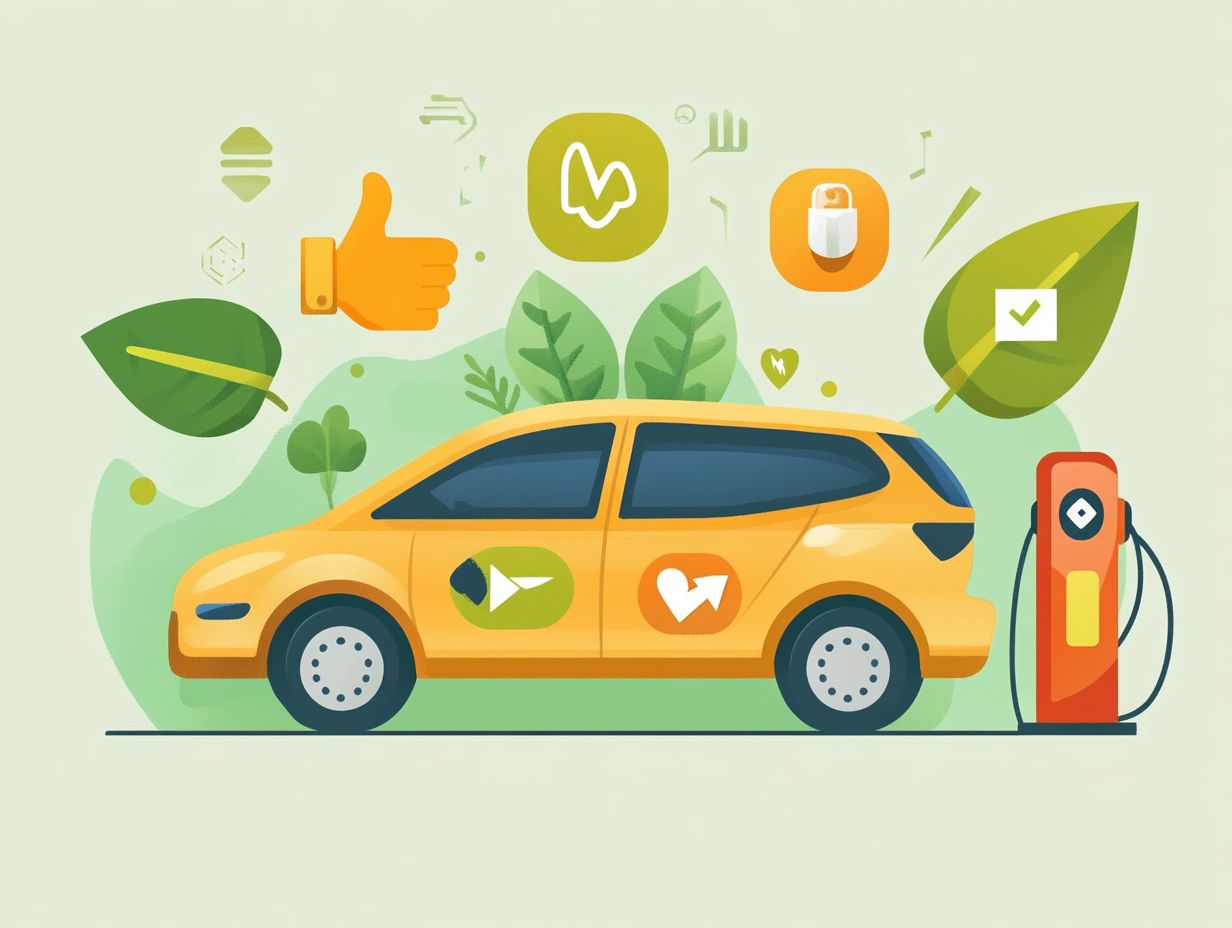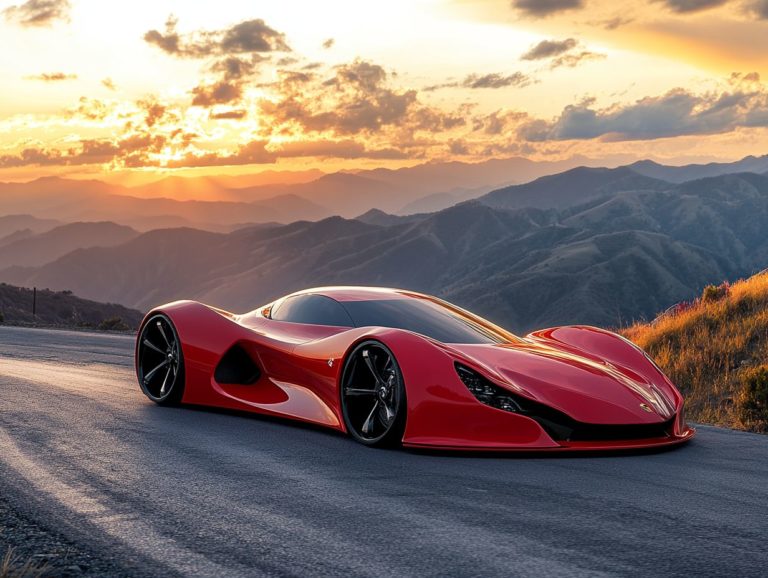User Reviews: The Pros and Cons of Hybrids
As the automotive industry continues to evolve, hybrid vehicles are gaining popularity. They offer superior fuel efficiency compared to traditional gasoline-powered cars. With promises of improved fuel efficiency and reduced emissions, coupled with appealing tax incentives, these cars often serve as a transitional option between traditional gas engines and fully electric vehicles. However, they do come with their own challenges, such as higher initial costs and a limited charging infrastructure. This article delves into the pros and cons of hybrid vehicles, empowering you to make a well-informed decision for your next ride.
Contents
- Key Takeaways:
- 1. Better Fuel Efficiency
- 2. Lower Emissions
- 3. Tax Incentives and Rebates
- 4. Can Be Cheaper in the Long Run
- 5. Less Reliance on Fossil Fuels
- 6. Regenerative Braking System
- 7. Good for Short City Commutes
- 8. Limited Range and Charging Time
- 9. Higher Initial Cost
- 10. Limited Availability of Charging Stations
- 11. Battery Replacement Can Be Costly
- 12. Performance May Not Be as Strong
- 13. Hybrid Models May Have Less Space
- 14. Maintenance and Repairs Can Be More Expensive
- 15. May Not Be Suitable for Long-Distance Travel
- Frequently Asked Questions
Key Takeaways:

- Hybrids offer better fuel efficiency and lower emissions, making them a more environmentally friendly choice.
- There are tax incentives and rebates available for hybrid owners, potentially making them more affordable in the long run.
- While hybrids may have a higher upfront cost, they can save money in the long term due to their fuel efficiency and potential tax benefits.
1. Better Fuel Efficiency
Hybrid vehicles have surged in popularity, and it s easy to see why. Their impressive fuel economy makes them appealing. This is ideal for those who are environmentally conscious or looking to save on fuel costs. Thanks to modern technology, hybrids offer superior fuel efficiency compared to traditional gasoline-powered cars.
The hybrid system combines a gasoline engine with an electric motor, allowing you to optimize energy use by seamlessly switching between power sources. This efficiency not only cuts down on fuel consumption but also results in lower emissions compared to conventional cars.
For perspective, the EPA reports that many hybrid models achieve an impressive 50 miles per gallon or more. This is a significant leap over the average 25 miles per gallon of standard gasoline vehicles.
While fully electric vehicles eliminate fuel usage entirely, hybrids serve as a perfect bridge for consumers transitioning toward greener options. They provide the versatility and range that electric vehicles sometimes lack, making your eco-friendly journey both practical and enjoyable.
2. Lower Emissions
One of the most compelling benefits of hybrid vehicles is their remarkable ability to substantially reduce emissions. This not only contributes to a lower carbon footprint but also resonates with your growing environmental awareness.
When you compare them to traditional gasoline-powered cars, which tend to emit significant amounts of carbon dioxide and other harmful pollutants, hybrids offer a smarter alternative. By harnessing a combination of gasoline and electric power, they operate more efficiently and cleanly. This translates to reduced greenhouse gas emissions a crucial consideration for consumers increasingly mindful of their environmental impact.
As the demand for eco-friendly alternatives continues to rise, your desire for vehicles that prioritize sustainability is well-founded. This shift toward hybrid technology reflects a broader commitment to preserving our planet while also addressing the practical needs of your everyday driving experience.
3. Tax Incentives and Rebates
Purchasing a hybrid vehicle often opens the door to enticing tax credits and federal incentives. These can significantly reduce your ownership costs, which is particularly appealing for those who value cost savings alongside environmental benefits.
These incentives can take the form of federal tax credits, varying based on the vehicle’s battery capacity and the green technology it employs. For example, the IRS currently offers credits of up to $7,500 for qualifying electric vehicles (EVs), making them much more financially accessible to you.
Many states also provide extra rebates or tax credits that can range from a few hundred to several thousand dollars, depending on local regulations. Together, these incentives lower your overall cost of ownership, transforming hybrids and EVs into not only environmentally friendly choices but also smart financial investments for anyone looking to minimize long-term expenses.
Are you ready to explore how hybrid vehicles can save you money and protect the planet? Act now to take advantage of tax incentives before they change! Join the green revolution today and make a positive impact on the environment!
4. Can Be Cheaper in the Long Run
While the initial purchase price of hybrid vehicles may seem steep, they often become more cost-effective in the long run. With lower maintenance costs, reduced fuel expenses, and significant savings over time, they truly offer value.
This advantage comes from advanced technology that enhances fuel efficiency, allowing considerable savings at the pump. Maintenance requirements for hybrids are generally lower due to fewer moving parts and regenerative braking, a system that captures energy when you brake to recharge the battery, thus reducing wear and tear.
You might notice that adopting a mindful driving style something many hybrid drivers embrace can extend your vehicle’s lifespan and lead to even greater long-term savings.
By making these subtle adjustments to your driving habits, you re not just contributing to environmental sustainability; you re also setting yourself up for substantial financial benefits over time.
5. Less Reliance on Fossil Fuels

Hybrid vehicles enable you to reduce reliance on fossil fuels by seamlessly incorporating electric motors and tapping into renewable energy sources. This not only enhances your impact on the environment but also promotes a transition toward sustainable energy.
By integrating electric motors with traditional gas engines, these vehicles improve fuel efficiency and create opportunities to harness clean energy to recharge their batteries. Embracing renewable energy, like solar or wind power, is essential in minimizing greenhouse gas emissions typically associated with conventional fuels.
As hybrid technology evolves, it inspires you and other consumers to explore cleaner transportation options. This shift benefits you directly and represents a progressive step toward a sustainable future, significantly reducing the ecological footprint for generations to come.
6. Regenerative Braking System
The regenerative braking system is a standout feature in hybrid vehicles, designed to elevate performance by capturing energy during braking and redirecting it to recharge the battery pack. This enhances your overall driving efficiency.
This innovative technology enables you to transform kinetic energy that would otherwise dissipate into usable electrical energy. Unlike traditional braking systems that simply return energy as heat, regenerative braking significantly minimizes wear on brake components and boosts your fuel economy.
By embracing this system, your hybrid vehicle not only provides smoother deceleration but also promotes greater battery longevity. The frequent recharging from braking plays a crucial role in maintaining optimal battery health.
As a result, you enjoy a dual benefit: enhanced performance and a more sustainable driving experience, while reducing your reliance on external charging.
7. Good for Short City Commutes
Hybrid vehicles are exceptionally well-suited for your short city commutes, where driving efficiency peaks thanks to the frequent stops and starts. This dynamic allows you to take full advantage of both the electric motor and gasoline combustion.
This unique combination leads to reduced fuel consumption and lower emissions, positioning hybrids as an environmentally friendly choice for those navigating urban landscapes. As you weave through congested traffic, these vehicles effortlessly switch between electric and gasoline power, adapting to whatever the moment demands.
Models like the Toyota Prius and Honda Insight have garnered a loyal following among city commuters, admired for their impressive fuel efficiency and compact designs that make maneuvering in tight spaces a breeze. By harnessing regenerative braking and optimizing acceleration patterns, you’ll love how this improves your daily drive while playing a part in creating a cleaner environment.
8. Limited Range and Charging Time
While hybrid vehicles offer a host of advantages, they also present certain challenges to consider. For instance, the driving range when relying solely on electric power can be quite limited. Additionally, the charging time may impact your overall experience with the vehicle.
Take the electric range of hybrids, for example. It often falls short compared to fully electric vehicles, which can cover much greater distances on a single charge. This limitation might create anxiety for those who prioritize long-distance travel.
The charging time for hybrids can feel inconvenient, especially when you compare it to the ease of accessing charging stations that fully electric models often require for extended trips. It s no wonder that many consumers weigh these factors carefully, leaning toward vehicles that support daily commutes while also offering flexibility and convenience for spontaneous road trips.
9. Higher Initial Cost
One notable drawback of hybrid vehicles is their higher initial cost compared to traditional gasoline-powered cars. This can certainly make you think twice, even with the long-term savings on fuel and maintenance in mind.
When you invest in a hybrid, the initial price often reflects advanced technology, including more complex systems that deliver power to the vehicle and sophisticated battery setups. It s important to consider how these costs can balance out over time.
While the high initial cost may make you think twice, many consumers discover that the savings from reduced fuel expenses and lower maintenance needs make hybrids a smart financial choice in the long run.
As awareness of these benefits grows, buyers like you increasingly weigh their options, carefully considering the long-term advantages against the higher initial costs.
10. Limited Availability of Charging Stations

The limited availability of charging stations is a real concern for you as a hybrid vehicle owner, especially if you’re considering a fully electric vehicle. This scarcity can significantly affect your driving experience and convenience.
When comparing the situation, notable challenges arise, especially when you compare it to the convenience of gasoline stations, which are readily available for quick refueling. As a potential buyer of hybrids or electric cars, you might find yourself weighing the hassle of searching for a charging station against the simplicity of refueling a conventional vehicle.
Many hesitate before choosing greener options, worrying about potential difficulties on longer journeys or unexpected trips. Such limitations not only narrow your choices when it comes to vehicles but can also hinder the broader adoption of sustainable technologies in the market.
11. Battery Replacement Can Be Costly
Battery replacement for hybrid vehicles can indeed be a significant expense. It’s something you must weigh carefully alongside maintenance needs and overall ownership costs during the vehicle s lifespan.
As you evaluate this investment, it’s crucial to explore the various costs associated with the battery itself. Consider not just the price of the battery but also labor and potential diagnostic fees when the time comes for a replacement.
You should also look into warranty options provided by manufacturers, as these can greatly alleviate some of the financial burden, offering you peace of mind during your ownership journey.
When you compare these costs to traditional vehicle maintenance expenses like oil changes, brake replacements, and tire services it becomes clear that while hybrid batteries may seem intimidating at first, they can present a different financial picture over time.
This comprehensive perspective enables you to make more informed decisions about your purchase and long-term budgeting strategy.
12. Performance May Not Be as Strong
You might find that the performance of hybrid vehicles doesn t quite match traditional gasoline-powered cars, especially in high-speed situations where acceleration and power are essential. However, hybrids shine in fuel efficiency, delivering impressive power that helps the vehicle accelerate quickly from a stop, making them ideal for urban driving.
When weighing performance metrics, consider how these vehicles handle in various weather conditions, like rain or snow. In such scenarios, hybrids may offer enhanced stability, thanks to the instant power provided by their electric motors.
Your preferences can vary significantly. While some drivers prioritize eco-friendliness and lower emissions, others may favor the robust feel of gasoline engines for spirited driving. These differing perspectives significantly shape the perception of hybrid vehicles in the marketplace.
13. Hybrid Models May Have Less Space
Hybrid models may sometimes leave you wanting in the interior space department compared to their gasoline-powered siblings. This can be a concern for families or those needing plenty of cargo room.
The limitation arises from design constraints necessary to accommodate the hybrid battery and its electrical components, often resulting in less legroom and reduced trunk space. As you explore your options, you may discover that you need to rethink your priorities, as the trade-off between fuel efficiency and usable space becomes clear.
Take the Toyota Prius, for example. While it’s praised for being eco-friendly, those cramped back seats can be a dealbreaker for larger families. Similarly, while the Honda Insight boasts a sleek appearance, it sacrifices trunk volume, compelling potential buyers to weigh their choices thoughtfully.
14. Maintenance and Repairs Can Be More Expensive
While hybrid vehicles may entice you with the promise of fuel savings, the reality of maintenance and repairs can sometimes be more significant than that of traditional cars, impacting your overall ownership costs.
This discrepancy stems from various factors, including the need for specialized parts and services that hybrids require. These components are often more expensive and less readily available than their conventional counterparts. For example, the batteries and electric motors in hybrids require a level of expertise that can drive up repair costs. The technology behind hybrid systems can complicate diagnostics, leading to higher labor fees at the repair shop.
When you weigh these expenses against those of traditional gasoline-powered vehicles, it becomes evident that long-term savings on fuel may not fully compensate for increased maintenance costs. This realization can make you question the true financial benefits of hybrid ownership.
15. May Not Be Suitable for Long-Distance Travel

Hybrid vehicles may not be the best choice for your long-distance travels, as their dependence on both gasoline and electric power can limit your driving range. This can compel you to make frequent refueling or charging stops.
This limitation is particularly evident during extensive road trips, where the interplay of fuel tank size and battery capacity complicates your travel logistics. While you may appreciate the flexibility of two power sources, it often leads to interruptions for refueling and recharging, especially in less populated areas with few charging stations.
In contrast, fully electric vehicles offer a more streamlined experience without reliance on gasoline, but they do require careful planning around charging infrastructure. Your decision between these vehicle types will be shaped by your personal driving habits, how frequently you take long trips, and your specific travel needs.
Frequent travelers often lean towards electric options, which provide clear advantages in efficiency and performance for extended journeys.
Frequently Asked Questions
Q: What are the main advantages of hybrid vehicles?
A: Hybrid vehicles typically offer better fuel efficiency and lower emissions compared to traditional gasoline-powered cars.
Q: Are hybrids more expensive to maintain?
A: Yes, maintenance and repairs for hybrid vehicles can be more costly due to specialized parts and services.
Q: Can hybrids handle long-distance travel?
A: While they can be used for long trips, hybrids may require more frequent refueling and charging stops compared to gasoline cars.
What are the pros of using hybrids?
Hybrids combine features from traditional and electric cars. This offers a more efficient and eco-friendly driving experience.
They provide better fuel economy and lower emissions compared to traditional vehicles.
Do hybrids have any cons?
Hybrids come with some downsides. They are often more expensive than traditional cars.
The battery may need replacement after several years, which adds to costs.
Are user reviews reliable for evaluating hybrids?
User reviews are valuable for insights on hybrid performance. Consider multiple reviews to get a well-rounded view.
What are some common complaints about hybrids?
Common complaints include lack of power and acceleration. Users also mention difficulty finding charging stations for plug-in hybrids.
Do hybrids require special maintenance?
Hybrids have complex engine systems and may need specialized maintenance. However, routine care is similar to that of traditional cars.
Can hybrids save me money in the long run?
Savings depend on your driving habits and local fuel prices. If you drive in stop-and-go traffic, a hybrid may save you money on gas.
However, if you mostly drive on highways or live in an area with low gas prices, savings might be minimal.






